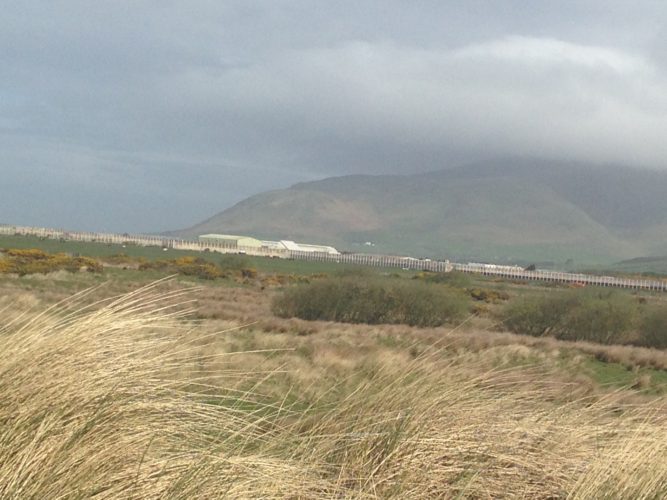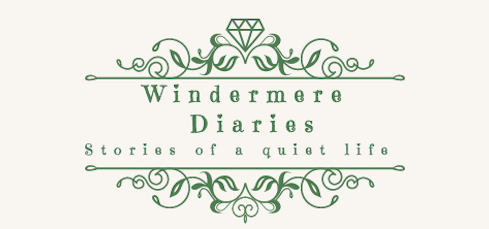
I think I like it here.
We have come to Haverigg.
We did make it all the way last night, we arrived here at about eleven and parked, wearily, next to the beach.
It was too dark to see anything then, so when we woke up this morning it was all a surprise.
We scrambled up the grassy hill and looked.
Miles and miles of sandy beach stretched out in front of us, running to the headland, beyond which white-topped foamy waves hurled themselves towards us.
We walked along the beach, facing into a blustery wind, and pointed out places that we recognised in Barrow on the other side of the bay. Seabirds shrieked and squabbled and dived, and the grassy patches on the dunes were bright with tiny flowers.
Apart from the birds, and the sea, and the occasional sheep calling to her lamb, it was utterly quiet.
We climbed over the dunes and along a sheep-track, until we reached the top of a little bank, and the prison was there, vast and sprawling, in the distance.
To be honest it didn’t look much more forbidding than most of the caravan sites that seemed to be straddling much of the landscape, apart from the inevitable razor-wire fence around it.
I thought this was tremendously exciting, and so when we got back to the camper van we packed ourselves up and drove around for a properly close look at it.
It turned out to be at the end of a long windy road with nothing much else on it, apart from a handful of neat little bungalows and some allotments.
From the road the prison itself was invisible behind the massive fence. There was a staff car park, and a visitors car park, both of which we ignored. We drove to the end of the road, which had begun to metamorphasise into a muddy sort of track, and stopped.
The prison used to be an air base, and we had stopped on the overgrown runway. Next to us were a couple of crumbly-looking caravans, a plot growing straggly Christmas trees, and a collection of makeshift allotments.
I liked the look of it all very much.
We made our way to the entrance of the prison, where a hand-painted sign explained that the Shop was Open, so we went to look.
The prison sells garden sheds and bits of ironwork made by the prisoners.
Mark inspected them and said that they seemed to be fairly solid and well made.
The shop was mostly empty, except for potatoes and garlic. A friendly sort of prisoner with bright eyes and a mild voice told us that we needed to come back next week, because that would be when the bedding plants would be in stock. I asked about the allotments and the caravans and the Christmas trees, and he said that they belonged to the prison staff.
I liked the place more and more.
He gave us a leaflet about garden sheds we went away, rather regretfully, because we couldn’t think of an excuse to dawdle about any more.
We went to look at Millom, which is the nearest town, just less than a mile away.
It is not very wealthy.
A butcher’s van selling Wayne’s Meats lingered in the square, in front of charity shops and a library and a hopeful church. There was a Chinese takeaway, which had an optimistic notice in the window saying that it could do Indian food as well, if anybody fancied it, and an ironmonger’s, and a post office, which seemed to sell bicycles and newspapers as well.
I liked the look of it anyway. It was neat and people were not scowling, indeed, it looked very much as though they all knew one another, and might even be all related.
We retreated to the shore, where we devoured cheese and pork pie, and then predictably, fell asleep.
When we woke up it was late afternoon. The skies were clear and the wind had dropped, so we hauled the dogs out from under the bed and went to walk.
We walked for miles, along the sandy shore and the causeway, brushing through spiky grasses and ducking under catkins. We looked at lighthouses and stone turrets and back towards the mountains of the Lake District, where it looked as though it might be raining.
We came back through the little village, where they have what must be the only pubs left in the world that don’t do food, so back at the camper van I cooked spiced chicken and buttery rice.
Mark did his maths then, and so I am writing to you.
It has been the loveliest of quiet holiday days.
I think I like it here.
